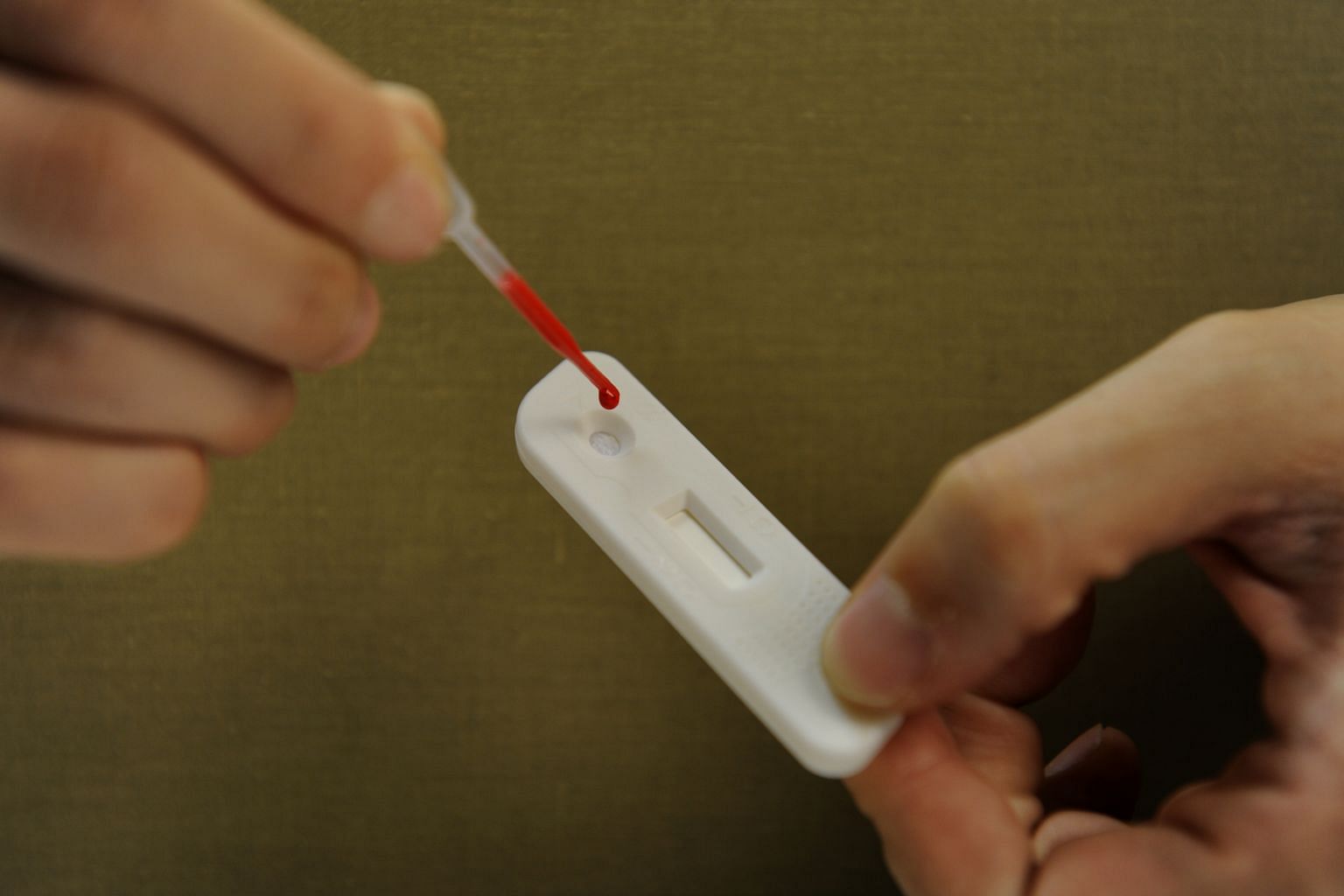Community comes up with plan to end HIV transmission and Aids in Singapore by 2030
Sign up now: Get ST's newsletters delivered to your inbox

A posed photo of a person using a do-it-yourself kit that tests for the human immunodeficiency virus (HIV) which causes Aids.
PHOTO: ST FILE
Janice Tai
Follow topic:
SINGAPORE - An ambitious community blueprint that targets to end human immunodeficiency virus (HIV) transmission and acquired immune deficiency syndrome (Aids) in Singapore by 2030 was launched on Saturday (Nov 23).
The blueprint is developed by 30 organisations and groups, which hope that it will kick start the development of a national strategy to end HIV in Singapore.
There are more than half a million people at risk of acquiring and transmitting HIV in Singapore, with the majority of them being heterosexual males as well as men who have sex with men, according to the blueprint which cited research studies.
Singapore with its small and highly literate population, world-class healthcare system and relatively well-funded HIV programme is in a good position to join the ranks of cities that can end the HIV epidemic by 2030, said Professor Roy Chan, President of Action for Aids, at the launch of the blueprint at Sofitel City Centre.
The document outlines what community stakeholders needs to do in areas such as prevention testing, treatment and outreach to reduce stigma.
A draft of this blueprint has been shared with the Health Ministry.
In response to queries from The Sunday Times, the Health Ministry said it will study the comments and recommendations in the Community Blueprint in detail.
It said all stakeholders, including those from the public and private sectors, and the community have important roles to play in the prevention, control of spread and detection of HIV, as well as the provision of support for people living with HIV.
The Ministry added that it shares the Action for Aids Singapore's interest in ending HIV transmission in Singapore and supporting people living with HIV and that the "Community Blueprint to End HIV transmission in Singapore" has provided a perspective on the community's efforts and targets to ending HIV in Singapore, and the impact that HIV has on patients and their families.
Action for Aids is one of the community organisations and groups involved in HIV and Aids work that developed the blueprint over the last two years. The other groups include Saw Swee Hock School of Public Health and the DSC Clinic.
"The community blueprint to end HIV in Singapore is audacious and ambitious, but we believe that the goal is realistic and achievable," said Prof Chan in his speech.
"The capacity to end HIV transmission is within our reach, but getting there will need work, collaboration and coordination. This document will serve as a starting point for discussions, planning and implementation of a national plan to end HIV in Singapore by 2030," said Prof Chan, who is also an adjunct professor at the Saw Swee Hock School of Public Health.
Other countries with such plans include Australia, where the Australian Federation of Aids Organisations announced a blueprint in 2017 that seeks to end HIV by 2020. Today, more than 70 cities around the world have also signed the Paris Declaration as Fast-Track Cities with the target of eliminating all new HIV infections and Aids-related deaths.
Prof Chan said such a target is possible, given various factors such as having effective anti-HIV medications that not only improve the prognosis of persons with HIV, but also stop HIV transmission. New biomedical prevention technologies such as Pre-Exposure Prophylaxis (PrEP) have also been shown to be able to stop HIV transmission. More accessible HIV testing will also lead to earlier diagnosis and treatment.
As of end 2018, a total of 8,295 Singapore residents have been infected with HIV, of whom 2,034 had died. There were some 400 to 500 new HIV cases detected among Singapore residents each year from 2007 to 2017.
There is no known cure for the disease. But effective antiretroviral drugs can control the virus and help prevent transmission.
The community blueprint is a roadmap of what organisations that deliver HIV programmes and services feel needs to be done to end HIV and Aids in Singapore.
It identifies gaps in services and proposes additional efforts and investment needed across community organisations, research field and the clinical workforce to end HIV transmission and Aids by 2030.
The five key areas identified in the plan are: scaling up reach and effectiveness of HIV prevention testing and treatment efforts for populations at risk of HIV; reducing HIV-related stigma and discrimination; building the capacity of the HIV community-based medical workforce and other resources; scaling up the adoption of PrEP for people who are at high risk; and evaluating HIV prevention programmes.
The first few cases of HIV infection in Singapore were reported in 1985. Since then, there have been tremendous biomedical advances in HIV prevention and treatment.
However, it was reported earlier this month that a new strain of the virus has been discovered by researchers in the United States, the first in almost two decades.
Dr Carole McArthur, one of the study's authors, said: "This discovery reminds us that to end the HIV pandemic, we must continue to outthink this continuously changing virus and use the latest advancements in technology and resources to monitor its evolution."
One of those who welcomed the blueprint is Action for Aids' advocacy and partnerships manager Avin Tan, 34, who has been living with HIV for 10 years.
"As a person living with HIV, having such a document means a lot to me. It outlines what the larger community will be doing or is doing to address the many layers of stigma persons living with HIV continue to experience in our day-to-day life."
This story has been edited for clarity.

